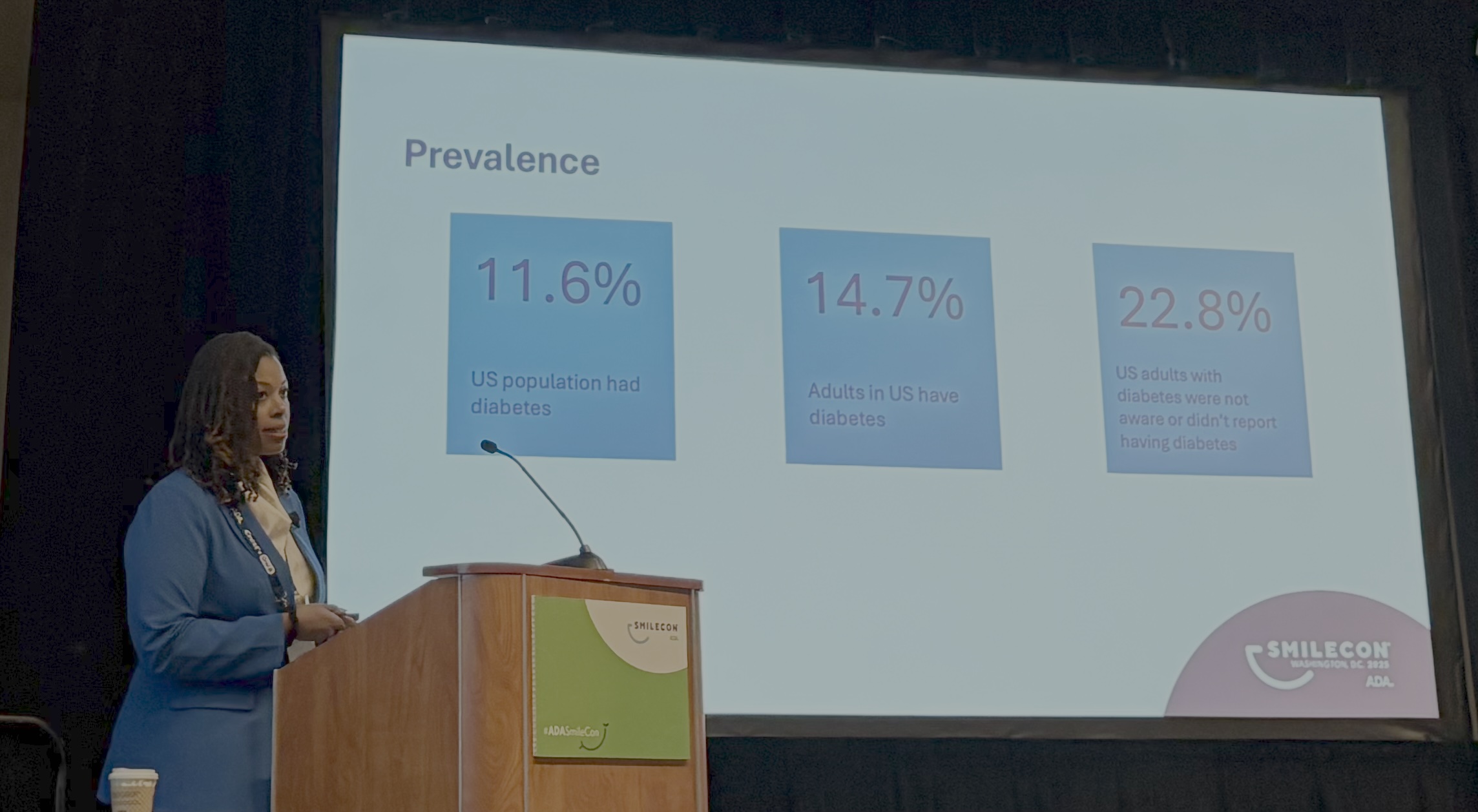Oral care considerations for patients using semaglutide, similar medications
Kimberly Sanders, Pharm.D, discusses oral health impacts of diabetes, weight loss medications

While they show promise for helping patients manage Type 2 Diabetes as well as lose weight, a growing number of popular prescription medications including Ozempic and Wegovy also affect patients’ oral health.
At SmileCon 2025 Kimberly Sanders, Pharm.D., an educator at the University of North Carolina, delivered a timely session titled, “Bite-Sized Breakthroughs: How New diabetes and weight-Loss Medications Impact Care,” where she discussed how the latest diabetes and weight-loss medications are reshaping patient care while highlighting what dental professionals need to know.
Dr. Sanders, who reported no conflicts of interest, opened with a refresher on diabetes prevalence and types, emphasizing that Type 2 diabetes is often a progressive disease that develops over time. She highlighted the American Diabetes Association’s annually updated, evidence-based guidelines as the gold standard for clinicians who care for patients with diabetes whether they work in a medical or dental setting.
“As health care professionals we should be empowered to be asking questions about our patients’ health status,” Dr. Sanders said. “Even evidence of periodontal disease is itself a risk factor for pre-diabetes.”
Dr. Sanders reiterated the bidirectional relationship between diabetes and periodontal disease, noting that periodontal treatment can not only improve oral health but also help improve glycemic control.
She noted that patients with diabetes face a range of oral health complications, including xerostomia, delayed healing, increased infection risk, peri-implantitis and reduced osseointegration of dental implants. Poor bone health and slower tissue recovery are also common, underscoring the importance of close collaboration between dental teams and medical providers.
While long-standing treatments like metformin remain in regular use, Dr. Sanders explained that newer drug classes are rapidly gaining prominence for both diabetes and obesity management.
Key among these are GLP-1 receptor agonists and dual GIP/GLP-1 receptor agonists, which not only help lower A1c levels but also promote significant weight loss and potential cardiovascular and neurological benefits. Semaglutide, marketed as Ozempic for diabetes and Wegovy for weight loss, has become one of the most widely recognized GLP-1 medications. Tirzepatide, sold as Mounjaro (for diabetes) and Zepbound (for weight loss), acts on both GIP and GLP-1 receptors, enhancing efficacy.
While these medications have been around for about 20 years, Dr. Sanders noted that their uses and outcomes are expanding dramatically. Over the course of a year, they can lead to more than 10% weight loss for some patients.
While these medications offer metabolic and systemic benefits, they introduce new oral health considerations that dental professionals must recognize. GI side effects such as nausea, vomiting and reflux are most common in the early weeks of therapy and can lower oral pH, promoting enamel erosion and changes to the oral microbiome. Nutritional deficiencies — especially when patients lack proper dietary guidance — can manifest as fatigue, hair loss and even reduced bone density.
Rapid weight loss can also alter facial esthetics, causing what has been dubbed “Ozempic face” Dr. Sanders noted. Additionally, early research indicates that these medications may affect tooth movement, slowing progress for adults undergoing orthodontic treatment.
Sanders urged clinicians to be alert to peri-implant health and bone density changes, as rapid weight loss may increase bone resorption risks. Encouraging patients to maintain adequate hydration, protein intake, and strength training can help mitigate muscle and bone loss among patients using these medications.
She also recommended avoiding opioid analgesics for these patients when possible, as they can worsen gastrointestinal side effects.
With the surge in popularity of GLP-1 medications, Dr. Sanders warned about online and nontraditional sources offering discounted versions of these drugs.
“It’s tempting,” she said, “But are we really injecting what’s in that medication?”
Reports of fraudulent and improperly compounded products highlight the importance of verifying prescriptions and encouraging patients to obtain their medications through legitimate healthcare providers.
The future of diabetes and obesity treatment is rapidly evolving. Dr. Sanders noted that seven new GLP-1–based drugs are currently in development, and emerging data suggest possible benefits for neurodegenerative diseases like Alzheimer’s and Parkinson’s.
For dental teams, it is important to understand the systemic and oral effects of these medications in order to provide comprehensive patient care. Dr. Sanders encouraged oral health professionals to ask about diabetes management and medication use during intake, discuss diet, nutrition and exercise habits, especially for patients experiencing rapid weight loss, and to reinforce the importance of consistent oral hygiene to counteract shifts in oral pH and microbiome balance.



